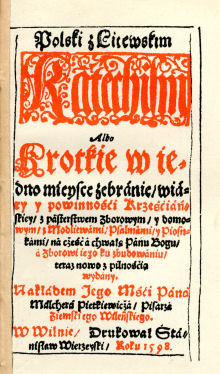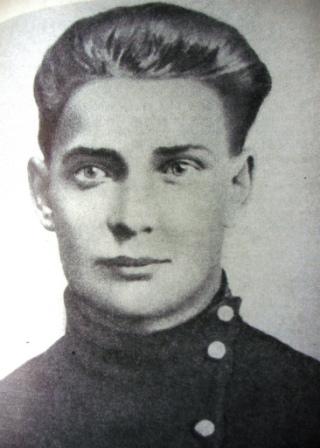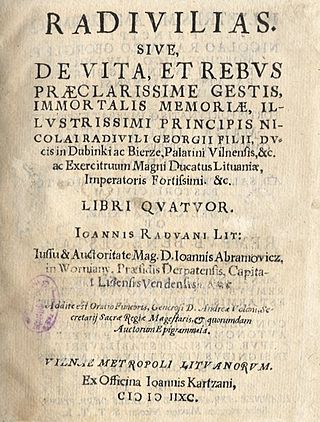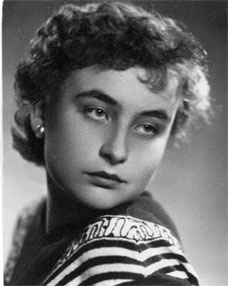
Jonas Mekas was a Lithuanian-American filmmaker, poet, and artist who has been called "the godfather of American avant-garde cinema". Mekas's work has been exhibited in museums and at festivals worldwide. Mekas was active in New York City, where he co-founded Anthology Film Archives, The Film-Makers' Cooperative, and the journal Film Culture. He was also the first film critic for The Village Voice.

Adolfas Mekas was a Lithuanian-born American filmmaker, writer, director, editor, actor and educator. With his brother Jonas Mekas, he founded the magazine Film Culture, as well as the Film-Makers' Cooperative and was associated with George Maciunas and the Fluxus art movement at its beginning. He made several short films, culminating in the feature Hallelujah the Hills in 1963, which was played at the Cannes Film Festival of that year and is now considered a classic of American film.

Lithuanian literature concerns the art of written works created by Lithuanians throughout their history.

Perloja is a village in Varėna district, Lithuania. It is situated 19 km (12 mi) to the west from Varėna on the banks of Merkys River and on the Vilnius–Druskininkai road. According to the 2001 census, it had 774 inhabitants. The village is known for the so-called Republic of Perloja, an independent, albeit unrecognised microstate that was established in the aftermath of World War I and existed until 1923.

Jonas Biliūnas was a Lithuanian writer, poet, and a significant contributor to the national awakening of Lithuania in the late 19th and early 20th centuries.
Jonas Zdanys is a bilingual poet, a leading translator of modern Lithuanian fiction and poetry into the English language., and a literary theorist whose writings on translation theory reinforce a conservative humanistic literary agenda. He was born in New Britain, Connecticut, in 1950, a few months after his parents arrived in the United States from a United Nations camp for Lithuanian refugees. He is a graduate of Yale University and earned a Ph.D. in English literature from the State University of New York at Buffalo, where he studied with Robert Creeley among other writers.
Augustinus Rotundus was a Christian and Renaissance humanist, erudite, jurist, political writer, first historian and apologist of Lithuania. Rotundus was vogt of Vilnius, general secretary to the Grand Duke and King Sigismund Augustus and elder of Stakliškės. After his nobilitation to the szlachta, Rotundus adopted surname Mieleski, or Milewski.
Vytautas Kubilius was Lithuanian literary critic and political activist.
Kerry Shawn Keys is an American poet, writer, playwright and translator. He is a citizen of the United States and Lithuania.

Liudas Gira was a Lithuanian poet, writer, and literary critic. His is noted for his early poetry, which resembles traditional Lithuanian folk songs. Gira was active in cultural and political life, gradually shifting towards communism in 1930s. He supported the Soviet Union and helped to transform independent Lithuania into the Lithuanian Soviet Socialist Republic. His son, Vytautas Sirijos Gira, is also a known poet and writer.

Merkelis Petkevičius was a Reformation (Calvinist) activist in the Grand Duchy of Lithuania. He was a nobleman who worked as a court scribe in Vilnius for almost thirty years. In 1598, he published the first Lithuanian-language Protestant book printed in the Grand Duchy of Lithuania. This book, a bilingual catechism in Polish and Lithuanian, was published in response to the publication of the Roman Catholic catechism of Mikalojus Daukša. However, book's heavy, artificial language with numerous loanwords make it linguistically inferior to Daukša's work.

Julius Janonis was a Lithuanian poet and writer. Born to a family of poor peasants, he began writing and translating poems at the age of 14. Learning from Maironis, he wrote about nature and suffering of the poor. His first poems were published in 1912. While still a student, he began contributing articles to Lithuanian press and joined activities of leftist aušrininkai.

Motiejus Gustaitis was a Lithuanian Symbolist poet, who used numerous pseudonyms. He was also a translator and educator, as well as a Catholic priest. A long-term chairman of the Žiburys Society, Gustaitis worked to establish Lithuanian schools and advocated girls' education. He worked as principal of girls' pro-gymnasium in Marijampolė and coed gymnasium in Lazdijai.

Pranas Vaičaitis was a Lithuanian poet. After graduation from the Marijampolė Gymnasium, he studied law at the Saint Petersburg University. Due to the violations of the Lithuanian press ban, he was imprisoned for a month in 1899 and could not find a jurist job.

Jonas Krikščiūnas known by his pen name Jovaras was a Lithuanian poet. From around 1896 to 1904, he was a book smuggler helping distribute the banned Lithuanian books. A son of poor peasants, he never received any formal education. He learned to read at home and with financial support from Žiburėlis studied privately in 1907–1910. In 1901, he met with Povilas Višinskis who taught him the basics of poetry. Krikščiūnas wrote most of his works in 1904–1910. Eight different poetry collections were published before World War I. His poetry built on the traditions of the Lithuanian folk songs. Two of his best known poems were adapted into folk songs. During the Russian Revolution of 1905, his works reflected struggles and suffering of the common people and socialist ideology. His later poems repeated socialist–communist slogans.
Žinyčia was the first Lithuanian-language cultural magazine targeting Lithuania proper. Established in 1900 by priest Juozas Tumas-Vaižgantas, it targeted members of the Catholic intelligentsia. Due to the Lithuanian press ban, it had to be printed in Tilsit, East Prussia and smuggled into Lithuania. The circulation was 500 copies. Due to its limited audience, the magazine could not financially support itself and after five issues was merged with Dirva, published in United States.

Radivilias is a Latin epic poem by Jonas Radvanas published in 1588. It is one of the major works of the 16th-century Lithuanian and Belarusian literature and one of the best examples of Renaissance literature in Lithuania. It uses hexameter and has 3,302 lines divided into four parts. It is dedicated to Mikołaj "the Red" Radziwiłł (1512–1584) and his major military victories in the Livonian War.

Judita Vaičiūnaitė was a Lithuanian writer. Best known for her poetic exploration of urban settings and mythological women, she is one of Lithuania's most famous 20th-century poets.

Kalvis melagis was a Lithuanian-language periodical published by Petras Vileišis and other Lithuanian students in Saint Petersburg, Russian Empire, in 1875–1876. Lithuanian publications were banned after the Uprising of 1863. As a result, Kalvis melagis was published in secret and was short-lived. It was a primitive hand-written and then mimeographed 4-page newsletter. Nevertheless, it is the first known Lithuanian periodical in the Russian Empire and one of the first Lithuanian periodicals overall.
The Naujosios Biržų žinios was the weekly county newspaper on matters of society, politics and literature. It was published in the Biržai county. It was published from 1941 to 1944. A total of 131 issues were published. It was the continuation of the Biržų žinios that was published from 1922 to 1933. From 16 January 1943 to 8 July 1944, the newspaper was published under the old title Biržų žinios.













